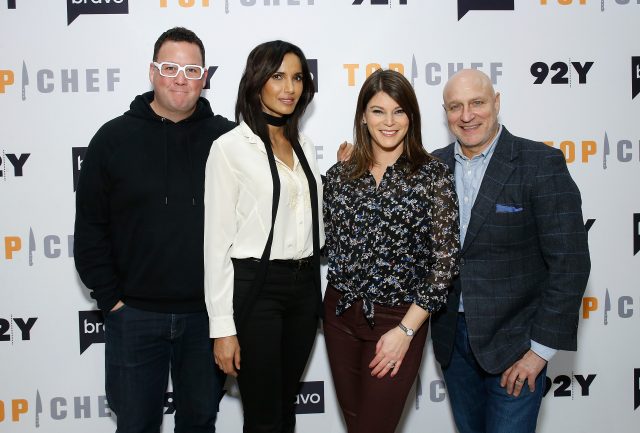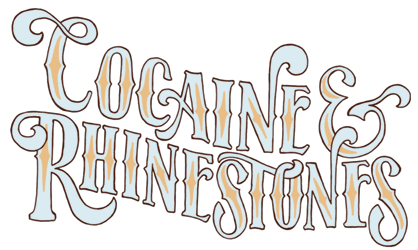Here at Ars Technica, we love our fair share of podcasts, including our own. That doesn't mean we do a great job covering the podcasting world, in part because we're creatures of habit. Ars staffers have their roster of favorite subscriptions to cycle through whether hopping a train, killing time on a flight, or dusting our shelves of vinyl miniature figurines.
Whether we'll do a better job shedding light on podcasts old and new in 2019 remains to be seen, but we're going to give it a shot. To that end, here's a catch-all list of podcasts that Ars staffers picked as their "favorites in 2018," whether because they were brand new, new to us, or just continued earning the No.1 spot on a media player of choice.

Pack Your Knives
Like anyone who has ever started a podcast, I now constantly have half-baked ideas for other podcasts. One of my favorites would be called something like "Side Hustle," "Downtime," or "OPP (Other People's Passions)"—essentially, I love hearing people I find smart, engaging, funny, etc. talk about something other than what they've become known for. (Think beloved Avenger Jeremy Renner's real estate hobby or author Haruki Murakami on running.)
Near the top of my theoretical guest list would be NBA writers Tom Haberstroh and Kevin Arnovitz, because they share a deep interest in two of my favorite topics: basketball and food. Quietly, these two areas have become increasingly intertwined in recent years (JJ Redick shows up in Bon Appetit, San Antonio team dinners have become the stuff of legend, and players obsess over everything from PB&J to wine). Arnovitz and Haberstroh's new podcast, Pack Your Knives, logically builds off this trend.
The two analytics-focused journalists combine their detail-driven methods with a love of food and apply it to the culmination of "culinary" and "competition:" Top Chef. They recap seasons in progress, episode by episode, sharing insights on cuisine right next to historical statistics on the show (did you know elimination-challenge winners in episode one win the entire season 43 percent of the time?!).
Eliminated chefs come on to dish about the process, and Arnovitz and Haberstroh study the tapes (past seasons, online-only episodes of Top Chef spin-off Last Chance Kitchen) to provide listeners with the same informed perspective on faro as they'd offer on free agency. And if you're the kind of person who prefers playoffs over pastries, naturally, these hosts have even devised a fantasy Top Chef format with an easy to follow play-along-at-home scoring system. (Season two just started, so queue up Top Chef Kentucky and listen in the day after.)
—Nathan Mattise, Features Editor
Cocaine and Rhinestones

When it comes to techie chatter, I subscribe primarily to YouTube channels, where my favorite technical wizards can couple their spoken analysis with charts and video proof. (My No.1 subscription is from the European wizards at Digital Foundry.) Podcasts, on the other hand, usually take me to more esoteric territory about the human condition.
My favorite of these as of late is Cocaine and Rhinestones, a historical retelling of the biggest stories in 20th-century country-and-western music. It's as "only a podcast" as you'll find on this list. For starters, that name! No radio station programmer would dream of putting a controlled substance in the title of a regular, hour-long show. And host Tyler Mahan Coe has clearly never attended broadcast-journalism school, as his delivery and cadence are the kind of stilted stuff you might expect from a nervous undergrad.
Coe sounds like the smartest storyteller at your neighborhood bar.
But get a load of that guy's last name: Coe. As in, the son of '70s country music legend David Allan Coe, one of the industry's first major "outlaw" singer-songwriters who revolted against phonier commercial takes on country music. Thus, every episode begins with a reminder that the Coe family has shared, witnessed, or been a part of some of the biggest classic country-industry stories of all time. As Coe writes on the podcast's website:
Imagine if an entire genre of music was allowed to go out of print when we made the transition from vinyl to CD. That's what I saw happening with the lore of country music. Most of what I'm talking about on Cocaine and Rhinestones has been written down in books but nobodys reading those books. Many of them have never even been converted to digital format. This history wasnt being passed on to a new generation. It was going extinct.
To his credit, Coe sounds like the smartest storyteller at your favorite, cozy neighborhood bar. He sums up various histories (music, politics, demographics) with callbacks to richer source material. He dollops his stories with revealing, catchy tunes in a ton of genres. He is careful to expose his bias before offering amusingly subjective takes. And he does well to emphasize why these stories matter, even if your understanding of country-music history is sub-novice.
My suggestion: start with the January 2018 episode about the Judd family and see if Coe's style is up your alley. Coe hasn't confirmed plans for a second season, but my fingers are crossed that he puts a few more country-history stories into the podcasting universe.
—Sam Machkovech, Tech Culture Editor
Thunder Bay
So I'm an idiot American. But I'm curious about Canada! So when I heard that, this year, there was a new true crime podcast exploring the seedy underbelly of Thunder Bay, Ontario, I had to check it out. (Who knew Canada EVEN HAD a seedy underbelly?)
Ryan McMahon, an Anishinaabe journalist, explores how this town not that far from the Minnesota border has seen the highest rate of per-capita violence in Canada. Why? Because of colonialism, indifference, racism, corruption, and a bizarre policy of bringing First Nations students from the rural north to this town en masse. Some of them end up dead. McMahon sheds incredible light on this unbelievable story.
—Cyrus Farivar, Senior Tech Policy Reporter
Radio Diaries
The Radio Diaries podcast is not new. In one form or another, its hosts have been giving microphones to people to record observations from their daily lives for two decades. But in recent years, Radio Diaries has grown into so much more, bringing to life a trove of archival audio as well as interviewing older people about past historical events.
One of my favorite things to do when I was younger—and something I wish I'd done more—was to sit with my grandparents and ask them about the world in their youth. This podcast does that but with people who were at the front lines of history. This year, there were some exceptional podcasts, including one about the Women Air Force Service Pilots during World War II.
I only wish Radio Diaries published more frequently, as new episodes only come out every few weeks.
—Eric Berger, Senior Space Editor
On the Media
Television news networks are partisan, controversy-driven, and corrupted by a demand for 24/7 coverage. Print is collapsing, leaving local communities without much-needed voices. Online media is saturated with both quality reporting and dangerous exercises in irresponsibility, and it can be hard to sort through which is which.
This is for the post-truth world were inhabiting.
Enter On the Media, which began life as a call-in show before spreading across the nation's airwaves via NPR. From challenging tropes about covering dead presidents to breaking down the doublespeak used by politicians across the spectrum, it provides not just the content but the context.
After the election of President Donald Trump, On the Media shared a recording of its internal discussions about how to cover the controversial new presidency moving forward. The two hosts, Brooke Gladstone and Bob Garfield, disagreed. It was messy and heated. It helped gave me a lens through which I could understand media outlets' different choices on the matter.
On the Media is worth a regular listen even if you don't work in the media. In the post-truth world we're inhabiting, you have to cover the medium, not just the message, to really grok whats going on.
—Samuel Axon, Senior Reviews Editor
Tricky
In a similar vein to my colleague Samuel, I cannot say enough good things about Tricky, "a podcast about the thorniest problems in journalism." Think of it as the successor to the late, great Guardian Media Talk podcast, in large part because one half of the Tricky host team is Emily Bell, former editor-in-chief at Guardian Unlimited and now a professor at the Columbia School of Journalism. The other half of the team is Heather Chaplin, founding director of Journalism + Design at the New School.
Short of spending an hour every week in the company of our own editor-in-chief Ken Fisher, there's no better way to get up to speed on the tumultuous times that this industry is facing. This is particularly important with regard to the troubled relationship so much of the media has with Silicon Valley tech companies coming along and eating everyone's lunch. And unlike Ken, Tricky just shows up in your podcast app of choice.
—Jonathan Gitlin, Automotive Editor
The Read

Despite working online, I try to remove myself from the insanity of the online world as much as possible. I don't follow Twitter beefs. I'm rarely on Facebook anymore. And I'm not one of the 122 million people who follow Kim Kardashian West on Instagram. However, I like to be kept abreast of the latest pop culture news, and for that, I turn to The Read podcast. New York City-based comedian Kid Fury and writer Crissle West host the podcast, chatting and ranting about the latest pop-culture happenings, particularly those within or that affect the black community in the US.
Recently, Fury and Crissle have devoted a segment of the podcast to talking about mental health—an important topic that's still considered taboo in many cultures. Those discussions are always enlightening and comforting for me, and I think all listeners could benefit from hearing them. While each episode has its serious notes, The Read is overwhelmingly positive and pure fun—Fury and Crissle's takes are always hot, their reads always biting, and I appreciate the duo's no-holds-barred attitude when digging into current events, politics, and listener letters.
—Valentina Palladino, Associate Reviewer
Hang Up and Listen
As one of the denizens of the #sportsball channel on the Ars Technica Slack, I enjoy talking about sports and listening to good takes from other people. My go-to for the latter is Hang Up and Listen, a weekly podcast from Slate.
If youre looking for bombastic hot takes, this is not for you.
While you might hear conversations about the most recent big game, Hang Up and Listen also delves into the hows and whys of all sorts of sports. The hosts go a long way toward making Hang Up a compelling listen when it drops every Monday afternoon. Josh Levin, executive editor of Slate, and Stefan Fatsis, author of the excellent A Few Seconds of Panic: A 5-Foot-8, 170-Pound, 43-Year-Old Sportswriter Plays in the NFL and Word Freak: Heartbreak, Triumph, Genius, and Obsession in the World of Competitive Scrabble Players host the podcast and are joined by people who cover the events they discuss.
If youre looking for bombastic hot takes, Hang Up is not for you. Tune in if you like intelligent conversation about the teams and sports you love, and stay for the Afterball.
—Eric Bangeman, Managing Editor
[contf] [contfnew] 
Ars Technica
[contfnewc] [contfnewc]







